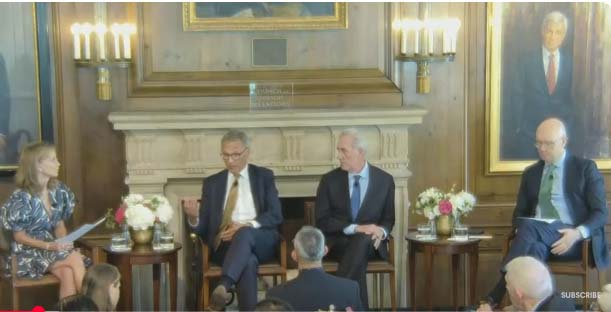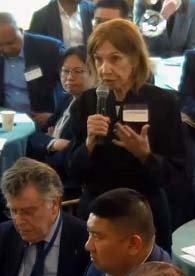By Lucy Komisar
May 24, 2025
At a meeting of the Council on Foreign Relations May 20th, some foreign policy experts from the U.S., Germany and Australia explained western “values.”
The event was the capstone of a meeting of The Council of Councils, a network of 28 policy institutes set up by the U.S. group to promote American policies through “consensus-building among influential opinion leaders from both established and emerging nations, with the ultimate purpose of injecting the conclusions of its deliberations into high-level foreign policy circles within members’ countries.”
In less fancy language, their governments should do what the U.S. wants them to do.

The panel included a German, an Australian and the U.S. Council president, Michael Froman. There was a lot of talk about values. Not surprising given the history of their countries, I discovered that values had nothing to do with opposing genocide.
Here is the video link. My question starts at 29 minutes in.
“I’m Lucy Komisar, I’m a journalist. To me in this discussion of international affairs, the elephant in the room is the genocide in Gaza. When I hear people talk about our values, since when do our values allow genocide targeting children, journalists, bombing hospitals? Why are you not talking about this?
This is as if this was in the 30s and the war was going on, and Jews were being cremated, and nobody was talking about that.”
Moderator Frances Fragos Townsend, Former Assistant to President George W. Bush for Counterterrorism & Homeland Security; Deputy National Security Advisor for Combatting Terrorism 2003 to 2004. On the board of the Council on Foreign Relations, the Atlantic Council (unofficial NATO think tank), Trilateral Commission and the International Republican Institute. Corporate executive and lawyer.
Okay, so let me ask of our Australian and German friends, is this a conversation both bilaterally and is it a conversation domestically?
Stefan Mair, Director, German Institute for International and Security Affairs. He is a 2010-2020 Member of the Executive Board of the Federation of German Industries (BDI) ie represents the interests of corporations. He has never held a position where he carried out foreign policy.
“It’s so far mainly a discussion domestically, and you know, it’s especially difficult discussion for Germany with our history.
And the Chancellor, also the former Chancellor emphasized that our support for Israel is a resource for the German state. There’s a lot of criticism discussion about that. But I think for German foreign policy, it’s quite, quite difficult, almost impossible to change their position with regard to Israel.
And as I said, we have intensive domestic decision discussions about that, but the official foreign policies are changing businesses.”
(He had earlier talked about “values,” but he meant the challenge posed by JD Vance in Munich.)
Michael Fullilove, Executive Director, Lowy Institute, Australia. Fullilove runs a foreign policy think tank, writes and speaks widely. He has never held a position where he carried out foreign policy
“Well, I don’t know that I accept that characterization from the questioner.
Australian policy has shifted under the Labor government to some extent, but I think Australians still understand the incredible really difficult situation that Israel finds itself in the Middle East and and to us I think it’s a difficult balance. It’s balancing those very different prerogatives.”
Townsend: Mike?
Michael Froman, President, Council on Foreign Relations. In Obama administration, he was U.S. trade representative and assistant to the president and deputy national security advisor for international economic affairs. Before that he was a top official of Citigroup, and in the 1990s worked at the Treasury, National Security Council and National Economic Council.
“Look, I think the situation in Gaza is tragic and we’ve had this conversation here many times since October 7th and even before but the brutal attack on October 7th. The fact that there still are hostages being held in Gaza, and the war in Gaza and the impact on the Palestinians who live there is all tragic. And the challenge is we as Americans tend to think, “Oh, there must be a solution.” You know, we just have to work harder to get there.
And this is one of those problems and one of those challenges we have to be honest and say we don’t see necessarily an end game here that is going to ensure that Israel has the security that any country including the United States would insist upon. And that the Palestinians have a pathway to the kind of rights and the kind of life that they deserve as well.”
A French guest sitting at a table: “Just for your information, France will recognize Palestine as a state. Well, Macron announced that. I don’t know what it will change, but diplomatically it is noticeable.” Then curiously, he said, “The diplomacy sometimes is to talk about things which do not exist.”
That says it all about these policy wonks’ talk about western “values.” Looking at their biographies, you see they all support the political and military hegemony of the West. No one speaks to human rights values. I record this here not because it will get them to denounce Israel’s bloody holocaust in Gaza, for which they complicitly attempt to provide cover, but just for the record, for posterity, to preserve on video how these soi-disant foreign policy influencers don’t have the vision or the courage to confront an overwhelming moral issue of their time.
Lucy Komisar has been a member of the Council on Foreign Relations since 1994.


